Former Barcelona superstar Lionel Messi has joined Paris Saint-Germain, the move bringing to a close the uncertainty over his personal future that has ebbed and flowed for a year. The Argentine's story may be entering a new chapter but it is likely to prove a prelude to a far broader and convulsive period for football.
The backdrop is the financial crisis that Messi’s former employers find themselves in. Barcelona's is among the worst situations but it is by no means an isolated case, even if the Spanish Primera Liga club is the arguably the most high-profile casualty of the mess that Covid-19 has wrought on the game.
Clubs and leagues across the footballing pyramid in Europe have been impacted from a reduction in attendances, commercial revenue and television income amid the response to the health crisis, including curbs and restrictions that affected all sport. The biggest football leagues – in Spain, France, Italy, England and Germany – are now grappling with a way forward that allows them to get back to a pre-pandemic normality, but the reality is that their business models may now prove to be unsustainable and perhaps have always been so.
A rising tide of riches, swelling up since the 1990s, on the back of growing interest in football from broadcasters and fans at home and abroad, including in the most lucrative markets such as China and the US, has lost its momentum.
Deloitte says "it will be a number of years before the full financial impact of the Covid-19 pandemic on European football is known". What we do know is that in the 2019-20 season, in the middle of which Covid-19 struck, European football revenue fell by 13 per cent, or €3.7 billion ($4.4bn), to €25.2bn as matches were postponed or cancelled amid social distancing measures, according to a report from Deloitte.
The impact on the following season, 2020-21, is yet to be revealed. The new season of European club football is about to kick off and there is an inflection point. Do we return to pre-pandemic levels of interest from fans and sponsors, or does the wane become something more permanent?
Deloitte is optimistic, projecting for example, that the revenue for the English Premier League will set new records. But even if this scenario materialises, there will probably be many clubs rationalising their spending.
A decade ago, wages in the five biggest European leagues added up to about €5.6bn. By last season, that combined wage bill stood at €17bn. Cumulative net debt held by Premier League clubs reached a record of almost £4bn ($5.5bn) in 2019-20, representing 88 per cent of the league's combined revenues.
The attendance at the Community Shield, the curtain raiser for the English season, was about 45,000 after authorities allowed London's Wembley Stadium to host the match at full capacity. To some observers this was cheering. To have restrictions on spectators removed and to see so many in full voice has been a long-awaited moment. However, attendances at this showpiece before the pandemic were at least 30,000 higher.

It will be a while longer before normal service is resumed. People across the world are still affected by the crisis and going to watch the football in person might not necessarily be a priority or be as practical as it was before.
Also, in Spain, attempts by the league to secure what is effectively a rescue package from a private equity group is heading to court as a result of opposition from Real Madrid, one of its biggest clubs. In France, court proceedings are ongoing over the fallout from the collapse of a football broadcast rights deal. Any cautious optimism, therefore, might be best replaced with plain caution.
Taking a step back, here is where the Messi situation becomes instructive of the differing viewpoints.
A year ago, I wrote in these pages that with the outlook so fragile for football, having a superstar such as Messi in your team was as close as a guarantee of economic survival as you could find. The sight of Messi, arguably the greatest footballer of all time, in tears at a news conference, as his two decades at Barcelona came to an end, was a huge global story.
The club was still attempting to profit commercially from the severed association, advertising Messi-related merchandise, amid the massive interest in the news. One consultant has calculated that Messi generated about €235 million more than he earned over the past four years, according to AFP.
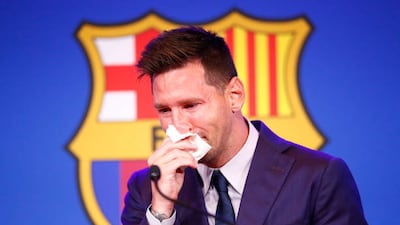
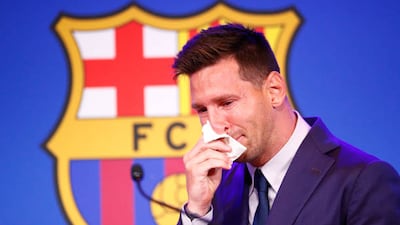
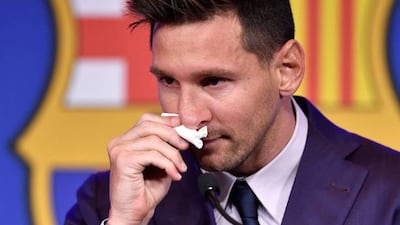
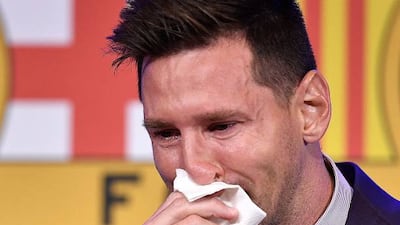
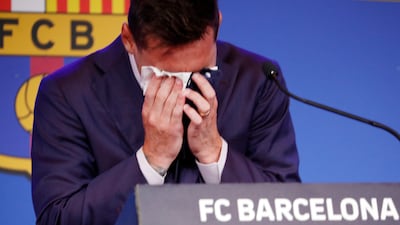
That Barcelona have allowed him to leave without the usual compensation of a transfer fee from a rival is bad enough. What is worse is that they will also lose the boost to their future sponsorship and commercial income from Messi’s absence. It looks bleak for them and the wider Spanish game. Messi was that important to a competition that usually lacks edge beyond the top two or three teams. Yet, that is how bad things had become for debt-laden Barcelona.
Now that he is gone, the club's president and board may be feeling that jettisoning Messi and his wages might give them breathing space to turn things around.
Equally, in France, they will be hoping that Messi’s presence will galvanise their own faltering economic fortunes by increasing audiences around the world, although it has made their own league even more lopsided in favour of the richest team, PSG.
In many quarters, there will have been the wiping of brows and sighing of relief.
There is also the faint echo of what happened a decade ago in another high-flying arena. For football, read investment banking. When Bear Stearns collapsed in March 2008, many observers assumed that would be enough of a wake-up call for the industry to put its house in order. Instead, it was only the prelude to the financial crisis. Six months later, Lehman Brothers failed, triggering a markets meltdown and leading, ultimately, to trillions of dollars lost across the world’s economies.
Much like the banking sector, football clubs and leagues are all linked by competition and the system of player transfers for example, and there is a risk of contagion if a club or league fails, threatening the financial stability of all. No one is immune.
The Messi saga should be an alarm bell for those who run football.



